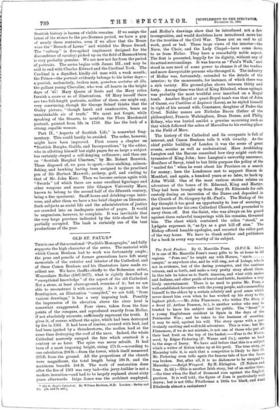The Peril Finders. By G. Manville Fenn. (S.P.C.K. 5s.)— It
is one of Mr. Manville Fenn's many gifts to be at home in all regions. "Pone me," he might say with Horace, "sjccis campis," or anywhere else, and he will sing, not of Lalage, who is not in evidence, but of the daring youngster, and the cautious veteran, and so forth, and make a very pretty story about them. In this tale he takes us to North America, and what with snakes and Indians, and other perils of travel and battle, furnishes a very lively entertainment. There is no need to praise Mr. Fenn, a well-established favourite with the young people, and commending himself to the elders by a certain sobriety and good sense which never desert him even when he has worked up his story to the highest pitch.—Mr. John Finnemore, who writes The Story of a Scout (C. Arthur Pearson, 5s.), is another writer who may be trusted to know his subject and his public. The " Scout " is a young Englishman resident in Spain in the days of the Peninsular War ; and he takes to the business of scouting, it may be said, against his will. The story opens with a par- ticularly exciting and well-told adventure. This is wise ; but Mr. Finnemore, if we do not mistake, is not one of those who put all their best fruit on the top of the basket.—True to the Watch- word, by Edgar Pickering (F. Warne and Co.), carries us back to the siege of Derry. We have said before that this is a subject which a writer of fiction takes up at his peril. The true story, as Macaulay tells it, is such that a competitor is likely to fare ill. Mr. Pickering even tells again the famous tale of how the boom was broken. But, after all, it is no dishonour to be unequal 0 Macaulay.—Ralph Winyard. By H. Elrington. (T. Nelson and Sons. 2s. 6d.)—This is another Irish story, but of an earlier time, —the time when the Earl of Desmond rose against the English garrison. It is well told; the figure of Joan is particularly well drawn; but is not Otho Fitzthomas a little too black, and Aunt Ethelred& ahaost a caricature?






















































 Previous page
Previous page